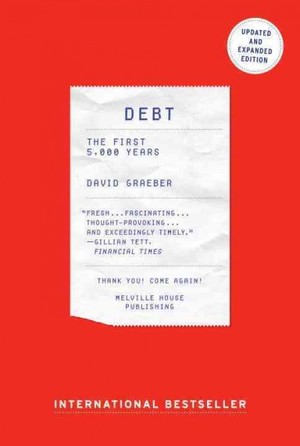Debt: The First 5,000 Years
David Graeber
Paperback
| IN STOCK | $26.99 |
|---|
I don't have time for a full review of this massive, sprawling text; like the author himself, anarchist anthropologist David Graeber, I've been a little more occupied than usual recently, as I'm sure many of you have been as well.
Nevertheless, despite being in the midst of a really exciting new wave of anticapitalist agitation, with lots of very practical things to be accomplished and very important meetings to be attended, I'm still going to recommend taking some time to devote to a reading of Graeber's text.
I'd argue that the book is really three books in one; first, it's a polemical engagement and anthropological deconstruction of the overwhelming majority of works in political economy's tendency to narrate economic history in a straightforward linear fashion, where barter leads to currency, and currency leads to debt. This toy reconstruction, on closer inspection, bears no real relation to the actual facts of the matter, in whichdebt often comes first: the obligation backed by threat, but also converted into the moral duty of the debtor, is a primary mode of structuring economic relationships in many societies.
This polemical point develops into the second major strand of the book: an exploration of the anthropological diversity of forms of economic life; especially the manifold ways in which the human being enters into relationships of exchange and indebtedness; here debt serves as a kind of kaleidoscopic prism by which to make sense of slavery, currency, patriarchy, friendships and emnities.
Having established the diversity of forms by which human society has mobilized indebtedness and its conceptual opposite, the consumated exchange with its discharge or renunciation of obligation, the third strand of Graeber's book than attempts to track the world-systemic rhythm between exchange and indebtedness, in which eras of debt alternate with those of hard currency, and in which the latter is most often associated with state violence. Debt, inasmuch as it can serve, in its best moments, as a way of humanizing the economy by making explicit the interdependent character of communal life, is not just the way the powerful make the exploited assume their subservience under the mantle of guilt, it's also a Utopian impulse, as Graeber's re-reading of popular power in the Middle Ages makes clear. If we've gone off the gold standard only a paltry few decades ago, then perhaps—and this is the big speculative perhaps on which the book ends—we're on the cusp of a similarly large transition, the dissolution of imperial modernity into something more conducive to a shared life together on this planet.
What holds these strands together here—perhaps the greatest accomplishment of the work—is Graeber's unflinching anarchist ethics. In many ways this is a political text born specifically out of the best, most internationalist moments of the anti-globalization struggle, and its calls for Jubilee, for the end of the debt as a tool that served to subordinate, globally, the South to the North. And in this era, when the structural adjustment programs are coming home to roost, and debt for homes, for education, for life itself mounts higher and higher at the same time the the debts of the powerful are annulled to save capitalism from itself, Graeber's book helps us think the politics of occupation with respect to the history of the past wave of global struggle, against the backdrop of a few millenia of massively diverse human experiences around the question of debt.
---John Duda
| ISBN | 9781612194196 |
|---|---|
| List price | $26.99 |
| Publisher | Melville House Publishing |
| Year of publication | 2014 |
| Other editions: |
|

